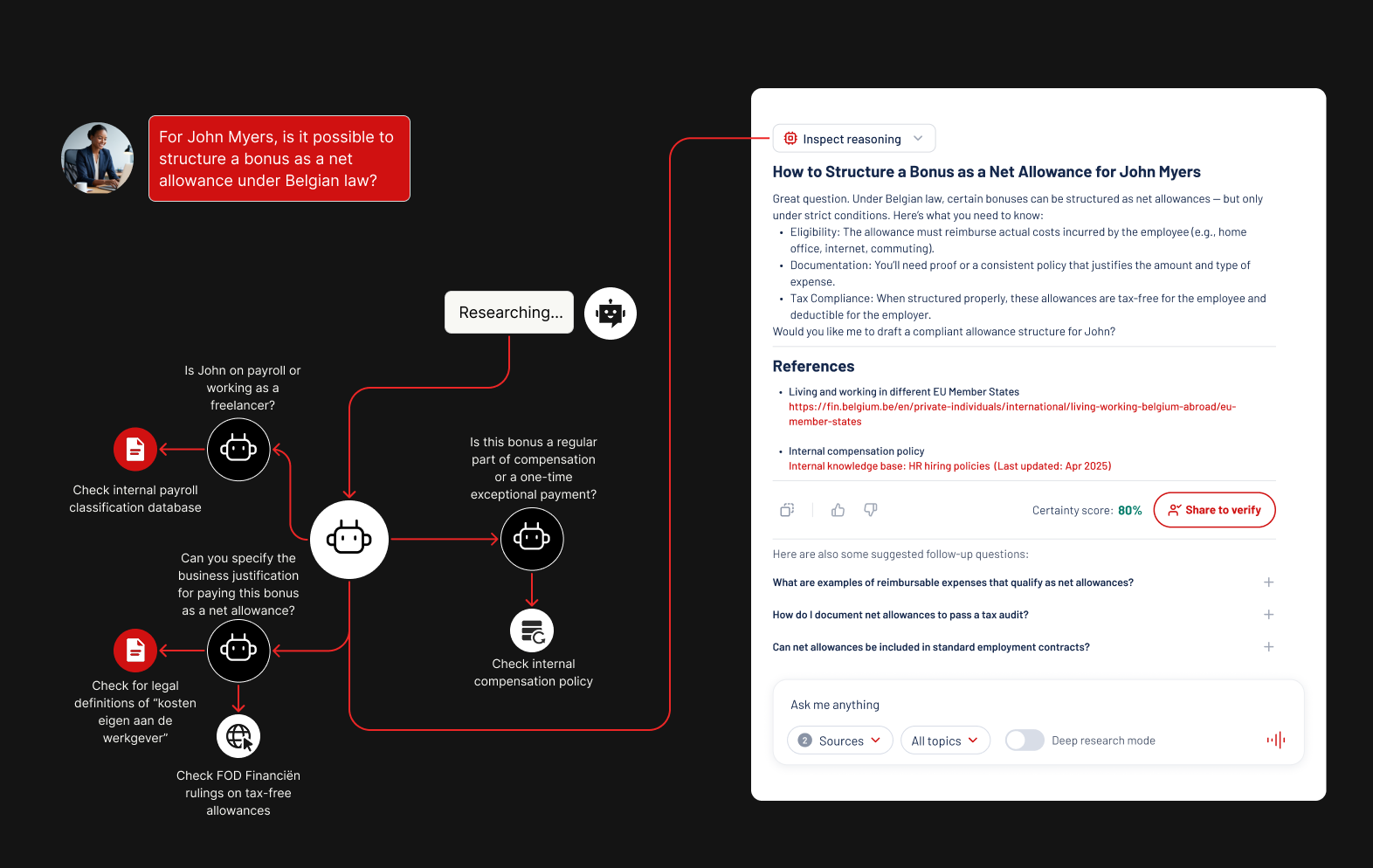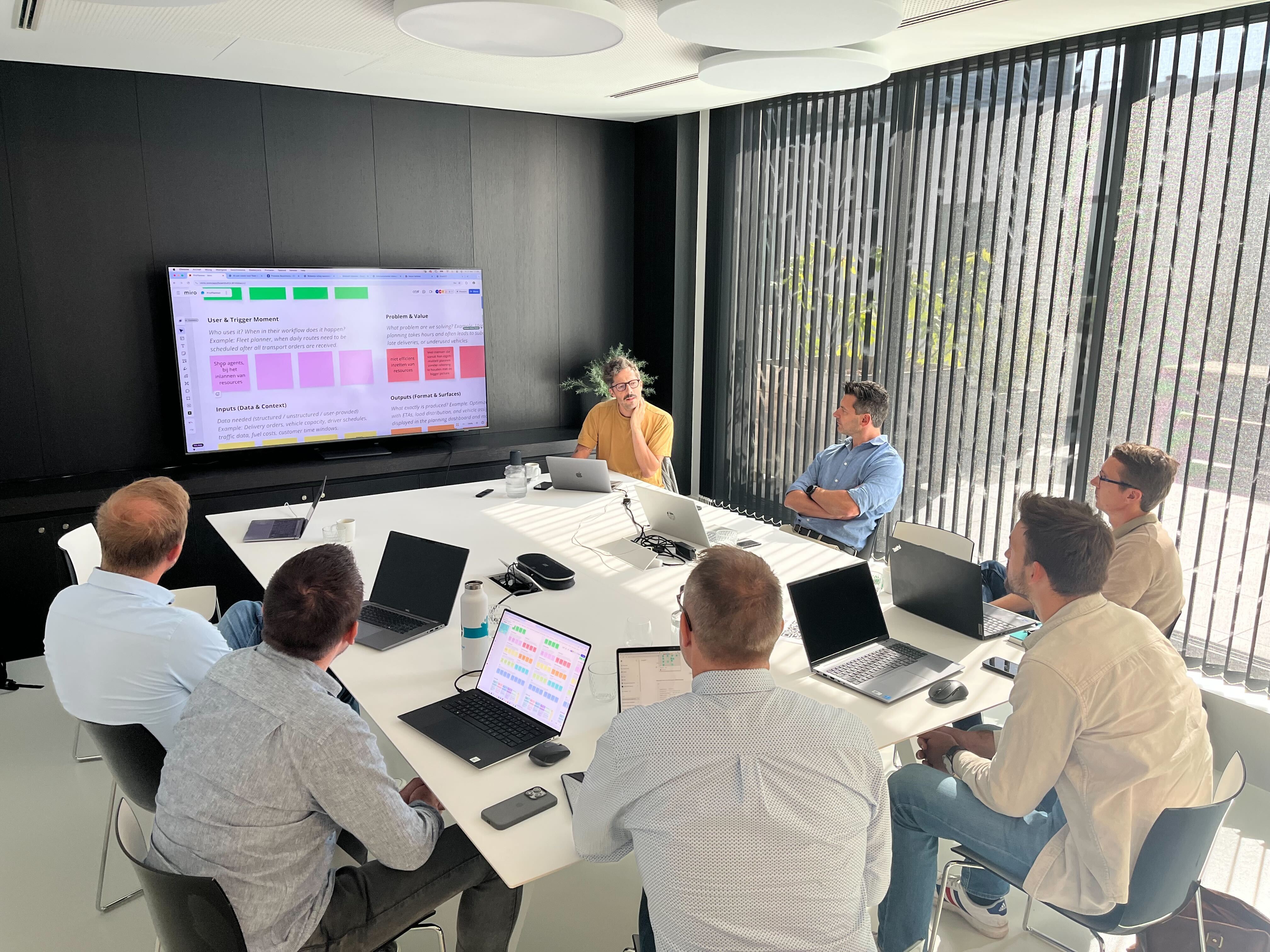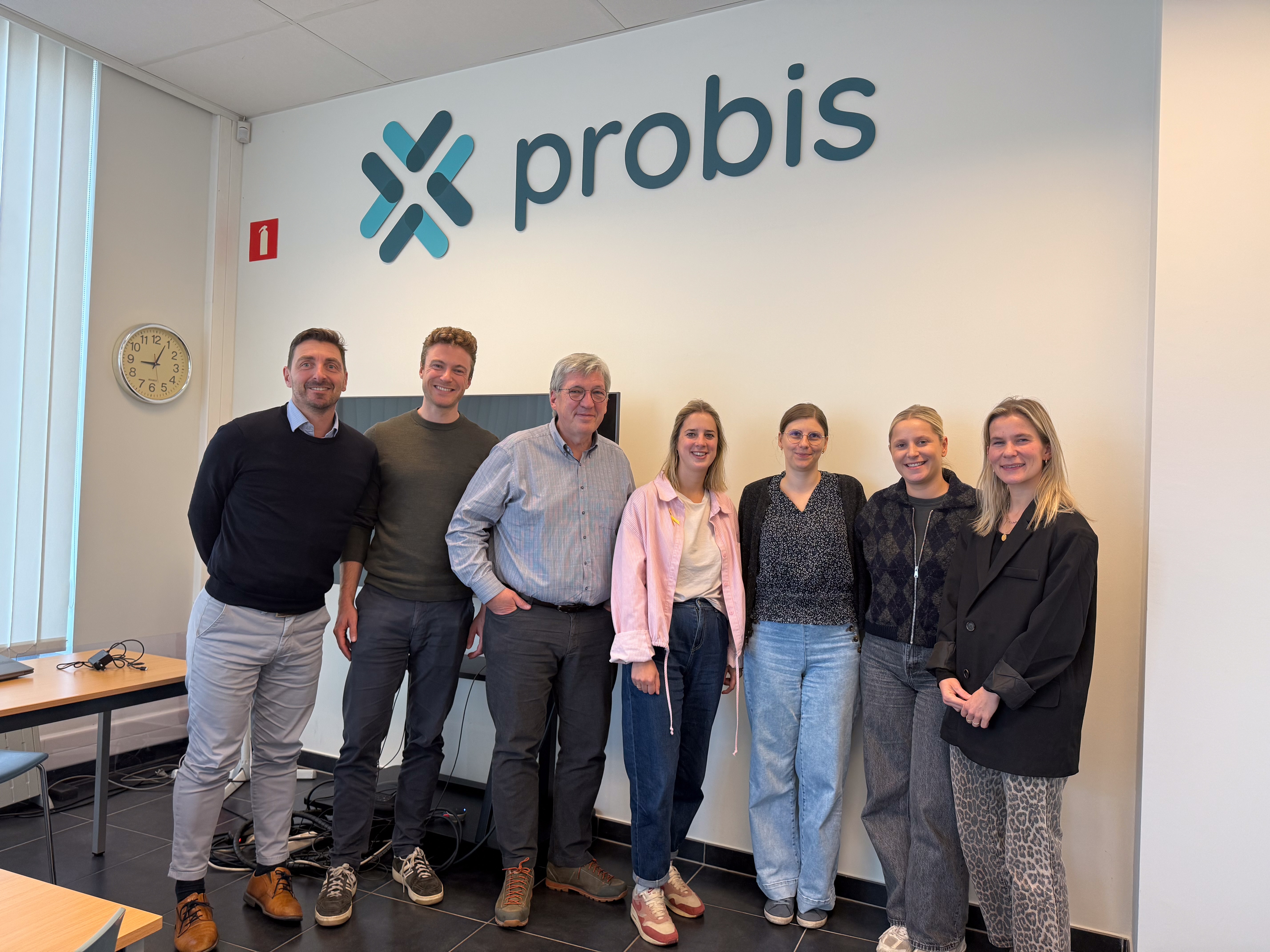In every industry, teams lose thousands of expert hours each year to one critical problem:
finding accurate and reliable information at the right moment to perform knowledge-intensive tasks.
Whether servicing a client, approving a loan, onboarding a new employee, or preparing a legal brief, valuable time is wasted searching, compiling, and verifying information scattered across siloed systems and tribal knowledge.
In this blog post, we’ll explore how Knowledge Management Assistants powered by AI agents can systematically tackle these challenges, empowering your teams to quickly access accurate information, reduce operational friction, and unlock sustained competitive advantages.
Knowledge-intensive Tasks & Ineffective Knowledge Management
Knowledge-intensive tasks look different across industries but share common complexities:
- HR and Social Services departments invest considerable effort in drafting contracts and internal policies, responding to complex HR/legal questions, managing employee benefits and compensation queries, overseeing performance management and disciplinary procedures, and ensuring regulatory compliance across diverse employee populations and legal environments.
- Financial Services teams regularly perform credit assessments, loan approvals, personalised investment proposals, compliance checks, audits, KYC & AML processes, comprehensive risk analyses, and regulatory reporting, each requiring precise access to multiple data sources and regulatory frameworks.
- Enterprise Software companies face significant challenges supporting pre-sales activities through technical discovery, managing integrations of highly customisable products, providing customer onboarding and implementation guidance, maintaining extensive technical documentation and troubleshooting resources, and configuring products for diverse client needs.
- Legal and Compliance professionals dedicate substantial effort to locating relevant laws, precedents, or clauses for new cases, compiling extensive documentation for audits or regulatory filings, drafting contracts and legal documents, conducting tax planning and compliance research, and performing due diligence across jurisdictions and practice areas.
These tasks are not only knowledge-intensive but highlight a deeper organisational challenge: ineffective knowledge management.
Organisations suffer from ineffective knowledge management primarily because:
- Critical knowledge remains trapped inside the minds of domain specialists and senior employees.
- Knowledge is scattered across unstructured, siloed, and disconnected documents and wikis.
Consequently, knowledge-intensive tasks combined with inefficient knowledge management lead directly to:
- Slow revenue growth
- Unscalable operations
- High onboarding costs and steep learning curves
- Increased risk of errors and compliance failures
- Frustrated customers and overwhelmed employees
Organisations require a systematic way to capture, structure, and share their institutional knowledge effectively.
Solution: Knowledge Management Assistants
At Faktion, we address this by developing Knowledge Management Assistants tailored specifically to your organisation's context, processes, and employee needs.
Building an effective knowledge management assistant requires a structured approach:
- Capture and organise existing documents, data, and business context.
- Leverage domain experts' knowledge to augment team capabilities.
- Validate trust and effectiveness before scaling broadly.
AI Agents Are at the Heart of This System
Successful knowledge management systems are powered by AI agents. Think of AI agents as your digital employees; they work systematically to make knowledge accessible and actionable.
These AI agents perform five critical functions for each query:
- Analyse input queries to determine relevance and execute targeted research across the knowledge base
- Generate comprehensive responses based on researched information and business context
- Capture user feedback and recommend improvements to the system and knowledge base
- Operate 24/7, scaling without the need to increase headcount
- Blend internal knowledge with external sources to give more complete answers

Multi-Agent Architecture: Continuous Learning and Improvement
The true power of knowledge management assistants lies in their multi-agent architecture, a suite of specialised AI agents that collaboratively monitor, analyse, and optimise knowledge retrieval and content quality. This multi-agent approach creates a self-improving system that becomes more effective over time.
- A Query Pattern Detector Agent classifies user queries and identifies complex patterns, proactively surfacing emerging informational needs. This agent helps organisations anticipate what information will be needed before users even ask for it, enabling proactive knowledge curation.
- A Retrieval Quality Monitor Agent continuously evaluates relevance, precision, and recall of retrieved documentation, ensuring consistently accurate responses. This agent maintains quality standards by identifying when responses drift from optimal accuracy and triggering corrective measures.
- A Feedback Analyser Agent systematically categorises user feedback, enabling precise identification of usability improvements. Rather than treating feedback as scattered comments, this agent identifies patterns and trends that reveal systematic opportunities for enhancement.
- An Insight Generator Agent synthesises insights from multiple agents, visualises performance data clearly, and enables targeted improvements. This agent transforms raw system data into actionable intelligence that guides strategic knowledge management decisions.
- A Recommendation Agent translates insights into actionable, prioritised enhancement strategies, ensuring continuous, validated improvements. This agent creates specific, prioritised action plans that guide system evolution based on real usage patterns and organisational needs.
Data Processing and Knowledge Base Enrichment
Behind every effective knowledge management assistant lies a sophisticated data processing foundation. A fully automated pipeline transforms raw, unstructured documentation into structured, searchable intelligence. By converting various formats into enriched markdown format, complete with semantic embeddings, intelligently generated metadata tags (including navigation data, related documents, summaries, and keywords), this pipeline significantly improves content discoverability and retrieval speed.
This automated enrichment process ensures that your knowledge base doesn't just store information; it actively enhances it for optimal accessibility and relevance. Documents become interconnected through intelligent cross-referencing, while semantic understanding enables the system to surface related content even when specific keywords aren't explicitly mentioned.
Evaluation Driven Development: The Foundation of Systematic Improvement
Built upon our Evaluation Driven Development, we make sure to measure real progress, capture feedback and turn that into action items, continuously learn and evolve. This systematic approach ensures that knowledge management assistants become more valuable over time, adapting to changing organisational needs while maintaining consistently high performance standards.
Outcome: Knowledge As Your Competitive Advantage
Knowledge is living and dynamic; it constantly evolves alongside your processes, people, products, and customers. Structured, accessible knowledge consistently outperforms siloed, unstructured information.
Thriving organisations understand knowledge management isn't merely about information collection; it's about systematically organising, maintaining, and deploying knowledge as a strategic capability—transforming institutional knowledge from bottleneck to competitive advantage.
Benefits go beyond efficiency. With intelligent assistance, domain experts gain the freedom to focus on strategic tasks, such as:
- Expanding the organisational knowledge base across teams and regions.
- Shaping new insights, products, and services.
- Increasing sales performance and customer satisfaction.
Implementing a knowledge management assistant tailored to your organisation's context creates a robust foundation for future competitive advantages, including:
- New revenue streams from data-driven, value-added services—enabled by comprehensive knowledge access that reveals previously unseen opportunities.
- Task and process automation systematically organises knowledge to maintain quality and enhance service delivery.
- Future autonomous workflows establish the groundwork for end-to-end automation capable of managing complex scenarios independently.
A structured approach to knowledge management represents more than operational improvement; it unlocks the full potential of your organisation's collective intelligence, transforming knowledge into your definitive competitive advantage in an increasingly complex business landscape.






.png)











